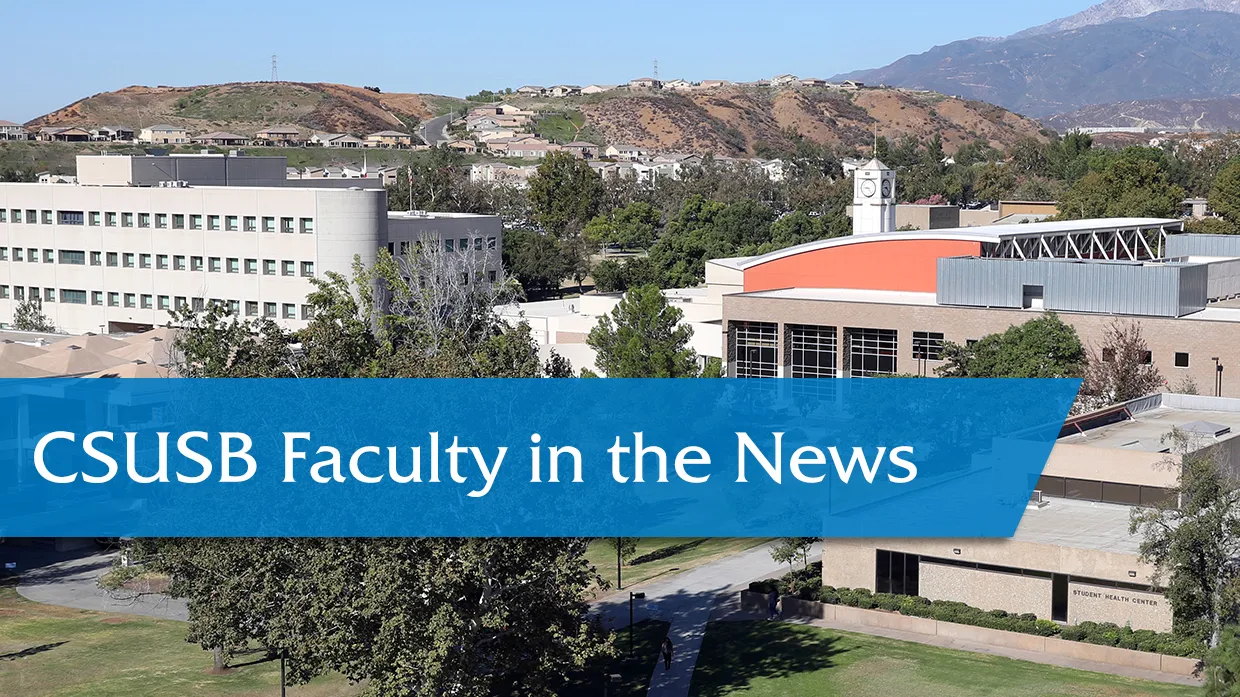NOTE: Faculty, if you are interviewed and quoted by news media, or if your work has been cited, and you have an online link to the article or video, please let us know. Contact us at news@csusb.edu
Iran will not be pressured into returning to negotiating table over sanctions, nuclear agreement, CSUSB professor says
Press TV
June 14, 2019
David Yaghoubian, CSUSB professor of history, was interviewed about the visit to Iran by Japanese Prime Minister Shinzo Abe, who had hoped to cool down tensions in the Persian Gulf region and between Iran and the United States. The trip coincided with two tankers – one of which was a Japanese-owned vessel – coming under suspected attack in the Gulf of Oman. The Trump administration blamed Iran.
Tensions have grown since the Trump administration pulled the U.S. out of the Joint Comprehensive Plan of Action – the multi-national agreement to regulate Iran’s nuclear program – a year ago, wanting to renegotiate for what it called a better deal. It also re-imposed tough economic sanctions on Iran.
Yaghoubian said Iran has made it clear that it would not be pressured into returning to the negotiating table with the U.S.
“Iran is simply not going to negotiate with the ‘insane clown posse,’” he said, in reference to the Trump administration, within in which some have adopted a hawkish stance against Iran. “Should the United States find a way, either the Trump administration or a new administration, to get back to the JCPOA to end the sanctions, then potentially there might be room for the negotiations in a context of mutual respect regarding mutual interests.”
See the interview at “B-Team won’t succeed in pressuring Iran into nuclear talks: Analyst.”
CSUSB center’s study cited in article about violence aimed at black transgender women
The Washington Post
June 17, 2019
A column by Petula Dvorak about hate incidents against transgender black women in the Washington, D.C. area cited the research done by CSUSB’s Center for the Study of Hate and Extremism.
Hate crimes have nearly doubled in Washington in the past two years. And it’s a trend followed by the rest of the nation.
Dvorak wrote: “‘D.C. is at an all-time high,” professor Brian Levin told my colleagues. Levin led a recent study at the Center for the Study of Hate and Extremism at California State University at San Bernardino.’”
The District had 209 hate crimes reported in 2018, up from 179 in 2017, 107 in 2016 and 66 in 2015. About half of those crimes were based on sexual orientation, according to the study.
Read the complete article at “The murder of black transgender women is becoming a crisis.”
CSUSB professor travels to Lebanon for screening of her documentary, panel discussion
Shababeek (Beirut, Lebanon)
The Arabic-language news site reported that Ahlam Muhtaseb, CSUSB professor of communication studies, was in Lebanon for the screening of the documentary “1948: Creation & Catastrophe,” which she co-produced with Andy Trimlett, on June 17. The publication also reported that Muhtaseb participated in a panel discussion at the Institute for Palestine Studies.
Muhtaseb also gave a lecture on June 18 on the Israeli boycott movement. Her talk was presented by the Galilee Development Society and the Majed Abu Sharar Media Foundation.
CSUSB professor relies on computer software visualization tools to improve STEM students understanding of math
Exchange Magazine (Canada)
June 18, 2019
Providing students with a strong understanding of complex ideas and concepts is a critical component of teaching. Using visualization tools to help students envision how formulas are impacted by changing data and parameters can go a long way in improving their grasp of mathematical materials. This is especially critical in science, technology, engineering and mathematics (STEM) courses, where students regularly encounter difficult concepts. Rolland Trapp, a professor at California State University, San Bernardino (CSUSB), relies on Maple’s visualization tools to provide his students with a deeper understanding of how formulas work.
Trapp was introduced to Maple while completing his post-doctorate at the University of Michigan. The school was piloting multivariable calculus modules using Maple. Trapp was immediately impressed by Maple’s visualization capabilities and has used it ever since. “I liked that you could develop 3-D intuition relatively easily in Maple,” he said. “There are good computational aspects, but it’s the visualization that I’ve really enjoyed.”
Read the complete article at “California State University professor relies on Maple’s visualization tools to improve STEM students understanding of math.”
These news clips and others may be viewed at “In the Headlines” at inside.csusb.edu.
